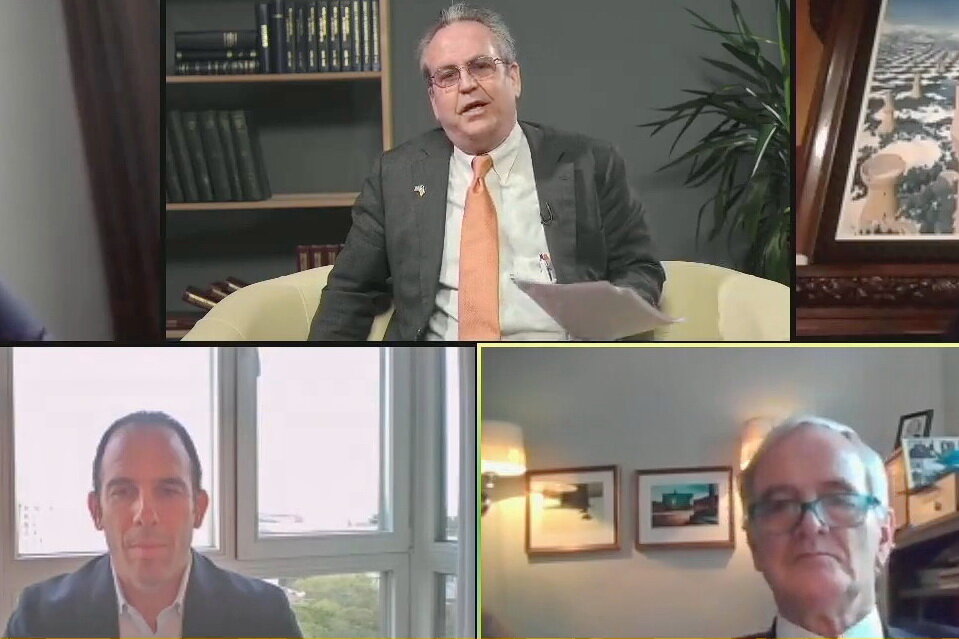Ukraine’s economy will be in a slightly better position than the economy of the European Union in the days after the COVID-19 pandemic, according to Anders Aslund, a senior fellow at the Atlantic Council in Washington.
While the EU is projected to lose around 10% of its gross domestic product in 2020, Ukraine will lose 8%. Ukraine’s trump card is its agricultural and iron ore exports, which may generate additional profit and save Ukraine from worse results, Aslund said during an online conference hosted by the Kyiv Post and Ukraine’s largest private power company DTEK on April 24.
“Agricultural prices do not fall in the depression because people need to eat,” Aslund said.
Willem Buiter, visiting professor of international and public affairs at Columbia University, agreed, pointing out that the current forecast of the Ukrainian government, which estimates that Ukraine will lose only 3.9% of its GDP in 2020, is “wishful thinking.”
“The pain will be a lot greater,” Buiter said.
Buiter is sure that, even when Ukraine returns to normal life, there won’t be the same amount of foreign capital flowing into the country due to slower global economic growth and fewer businesses willing to invest.
Seasonal workers return home
Another blow to Ukraine’s economy will be a major decrease in the amount of remittances, which reached $15.8 billion in 2019, over 10% of Ukraine’s GDP.
It is “doubtful that all of Ukraine’s foreign remittances will come back,” Buiter said. The same will happen with foreign direct investments, he added.
At the same time, hundreds of thousands of people returning home isn’t such a bad thing.
Those Ukrainians forced to abruptly come back from Poland and other EU countries due to the pandemic are bringing their knowledge and skills back to Ukraine, which can have a big economic impact, according to Aslund.
“These people can set up enterprises and they should be encouraged to use skills they have developed (abroad),” he said. Instead of “brain drain” Ukraine now has “brain gain,” he added.
Watch the “Post-COVID World & Ukrainian Economy” discussion here. It was held on April 24.
No financial gloom for Ukraine
One thing that all the experts participating in the April 24 online discussion agreed upon unanimously was that the Ukrainian financial system won’t go into a deep recession after COVID-19 subsides, a prediction widely discussed before.
“It seems that’s not so likely now,” said Aslund, mentioning that recently the National Bank of Ukraine cut its basic interest rate from 10% to 8% and there were “no negative reactions on the exchange market.”
In addition, Ukraine’s national currency stabilized at the level of Hr 27 per $1, while the country has nearly $25 billion in reserves and awaits an $8-billion loan from the International Monetary Fund.
“Right now the situation is stable,” said Aslund, making a prognosis that quarantine in Ukraine will end in June, even though the current official end date for the restrictions is May 11.
Even more investment projects?
Jason Pellmar, another economic expert taking part in the discussion, predicted that when the pandemic ends, Ukraine’s banks will be fine.
Pellmar is an International Finance Corporation (IFC) regional manager in Ukraine, Belarus and Moldova, and he believes that all banks’ projects in Ukraine will continue operating despite the coronavirus crisis.
For example, two major concession projects in seaports collectively worth over $150 million are still set to be started: Olvia, a 180-hectare seaport in southern Mykolaiv Oblast, and another one in Kherson.
“These concessions should be signed in the coming month,” said Pellmar.
The expert also believes that, when Ukraine’s government stated that the country needs better roads, it gave a positive sign to investors like him. Pellmar’s IFC is willing to invest, and he’s sure other investors will be willing, too.

Jason Pellmar (L), International Finance Corporation regional manager in Ukraine, and Willem Buiter (R), visiting professor of international and public affairs at Columbia University, took part in the discussions during online conference on post-COVID world and Ukrainian economy on April 24, 2020.
The situation is similar with regional airports, which might become another attractive sector for foreign investors in the upcoming years.
In addition, since the pandemic demonstrated many problems of the local health care system, this very system may be another potential sector to finance in the future.
Among other sectors in Ukraine with high chances to receive funding from the IFC are fintech, dairy, irrigation and grain storage.
“There is a lot to be done,” Pellmar said. “We are not stopping, we are continuing to invest.”
